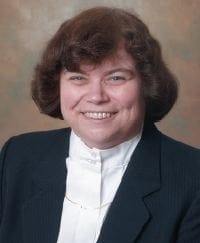These are the best of times for Sharon Fordham. When Wharton Alumni Magazine spoke to Fordham in October, 2007, she was basking in the glow of the critical and audience success of a “Tale of Two Cities,” a major new musical she helped produce in Sarasota, FL, and hopes to bring to New York’s Great White Way this coming season. She was even more optimistic about her “day job” – launching a new online community cofounded by her venture fund, The Fordham Group.
Fordham’s optimism is backed up by a long line of successes online and off. She was the driving force behind the launch of the mini snack category with many blockbuster products from Nabisco, including SnackWell’s, Teddy Grahams, and Ritz Bits, she resuscitated the LifeSavers Candy Company, directed global e-business strategy for Nabisco, and oversaw WeightWatchers.com into a profitable online community in the early 2000s when other e-commerce ventures were crumbling. “I follow the opportunities,” she said. “I don’t really worry about if I have the skill sets or knowledge because at the end of the day, business is business and skills are skills. Marketing and sales are fundamentally the same even when the delivery may be different. Good business people will find their way in the environment.”
Fordham made her name as senior marketing leader for Nabisco, first during the 1980s when she launched a successful soft-cookie line amid a fierce competition with Procter and Gamble and Frito-Lay, known as the “Cookie Wars.” After moving on to launch groundbreaking products including Teddy Grahams and Snackwell’s, she parlayed her marketing knowledge into e-commerce first as the president of LifeSavers during the phenomenal launch of Candystand.com.
In 1994, she took on the task of reinvigorating the ailing LifeSavers subsidiary, where profits and sales volume had dipped. Fordham tackled the company’s supply-chain problems and introduced multiple new hit products, such as Ice Breakers gum and CremeSavers candy. Within three years, profits had more than doubled, net sales had increased significantly, and the Candystand.com website was launched.
As president of LifeSavers, Fordham believed that “destination” or content sites would hold visitors and bring them back far more frequently than websites filled with “brochureware,” which offer little more than product descriptions and company histories. Instead, the Candystand site offered free state-of-the-art games.
“When you think about the amount of time you spend playing one of our games, the brand message is constantly on the screen helping to propel brand awareness and image in a way we’ve never seen before, even in the off-line world,” Fordham said. “We felt that we wanted something that would bring people back. When we tried to envision the future, we felt the Internet was going to evolve along the lines of the TV economic model, so we were sure that providing content (much like a TV show) was the way to go.”
Nabisco rewarded her with a new challenge as its president of global e-business. She built Nabiscoworld.com, another very successful industry-leading website, during her tenure as president for a year and half until Kraft bought out Nabisco in a wave of industry consolidation. Fordham moved on to become chief executive at WeightWatchers.com, Inc., turning the pre-revenue early stage company into a profitable subscription site. “I wanted to get experience in the venture industry,” she said. “I wanted to get experience in running a multinational company, and we [WeightWatchers.com] added several subsidiaries in major European countries during my term as CEO, and of course I wanted to firm up my e-commerce experience.”
“It was tremendous experience overall. The company was very successful, and the buyout was very successful,” she continued, referring to the buyout of WeightWatchers.com by the licensor, Weight Watchers International, at a hefty multiple that she helped orchestrate. Next Fordham took the opportunity to pursue her own promising venture idea until she uncovered intractable legal issues. “I knew enough about new businesses to know when you should hold and when you should fold,” she said.
The insight gleaned from her meetings with investors and fellow entrepreneurs led her into the next act of her career as a venture capitalist with The Fordham Group, founded in 2005. “I’m not a pure entrepreneur,” she said. “I’m more comfortable on the investor side and as a cofounder. It’s been a fascinating transition. You really see the future in many of these little startup companies.”
The company has a portfolio of seven companies, including two in water drilling and another in microbe testing that reduces the cycle time and increases the accuracy in testing for food contaminants. Fordham is devoting much of her energy to a project that is closest to her expertise – an online entertainment and social community. “We’re about halfway built at this point and marching toward market entry in the foreseeable future. That’s consuming a huge amount of my time, and I’m cautiously optimistic about our prospects,” she said
For Fordham, the best of times are always yet to come.

























